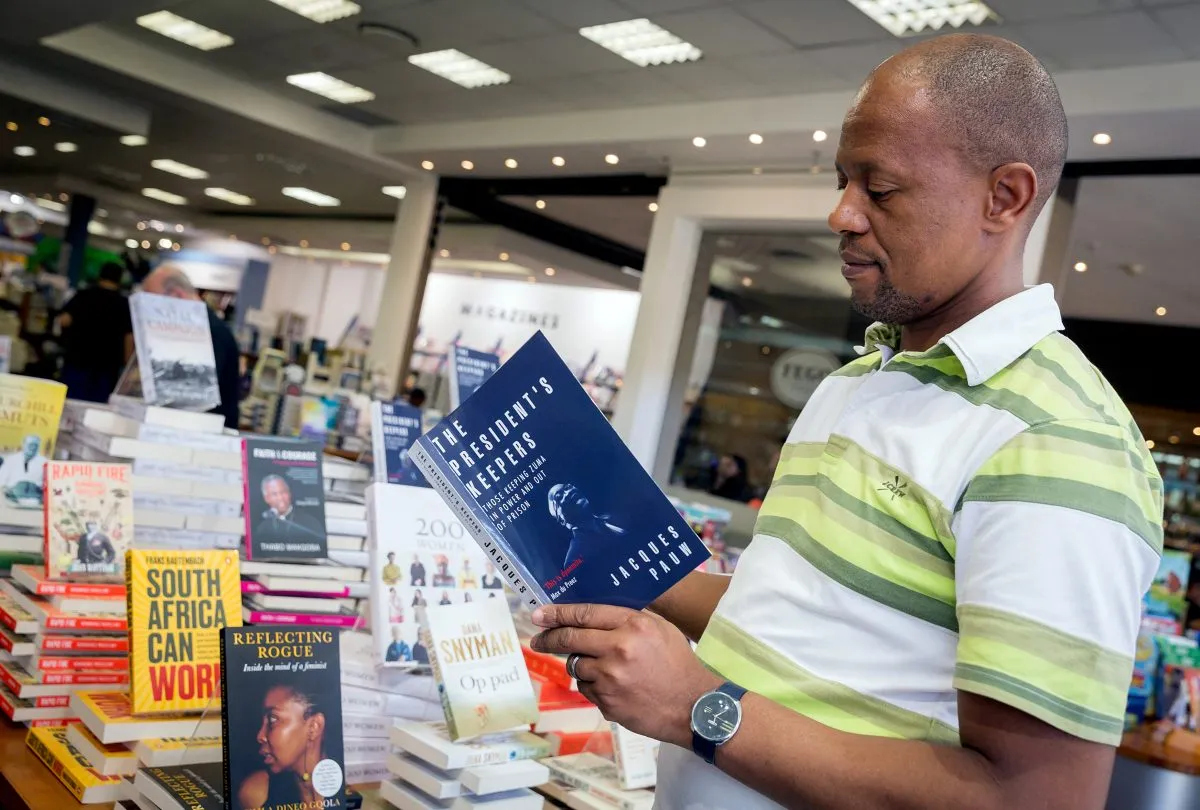Stepping inside the Book Circle Capital shop in Melville, Johannesburg, book lovers are immediately met by floor-to-ceiling shelves that are brimming with vibrant and colourful titles by authors from across the continent – from the latest popular fiction to weightier academic criticism. This independent bookshop prides itself on celebrating voices from across the continent, and it holds a vast collection of stories told by Africans, African-Americans, those from the African diaspora, and, of course, authors from South Africa. Book Circle Capital was founded in 2016 by Loyiso Langeni. His vision was to bring the magical world of books and stories to ordinary people – and the shop has gone from strength to strength ever since.
South Africa boasts one of the most established publishing industries on the continent and is home to many successful independent publishers such as Jonathan Ball Publishers, founded in 1976 to publish books by South African authors in addition to successful international titles. Global publishing house Pan Macmillan has an office in Johannesburg, and Penguin Random House has three offices in the country, in Pretoria, Cape Town and Johannesburg.
Yet despite the entrenched position of these independent and international players, publishers in South Africa are still grappling with a fragile ecosystem that is plagued by obstacles including high production costs, infrastructure challenges and prohibitive shipping costs.
“South Africa has VAT on books, and that plays a huge role in pricing,” says Kelly Ansara, marketing and publicity director of Jonathan Ball Publishing. “If books are being imported, like internationally published titles by authors such as Stephen King or Jodi Picoult, these books carry extra costs, like freight costs and foreign exchange.”
The story is similar for books published within South Africa, with costs remaining high. “Print costs, including paper and material costs, are forever rising, and this plays a part in the final cost of the book,” explains Ansara. “As printing and distribution costs get more expensive, the per-copy cost starts to creep up.”
This in turn poses a conundrum for publishers. It often costs tens of thousands of dollars to get the first copy of a book on the press; the second copy may cost a couple of dollars to print and that cost falls as more are printed. Do they print more copies of a book to get lower unit prices, or do they print fewer to keep upfront costs down, but in doing so risk restricting distribution?
Distribution challenges
Outside of South Africa, the outlook, particularly for books written by African authors, is similarly concerning. Stephanie Kitchen, co-director of the African Books Collective, a distributor in Oxford, UK, says “generally printing in the continent isn’t well developed… it’s not affordable or high enough quality.” She explains that for many African countries, printing in countries as far away as India or Turkey and then shipping the finished books back into the country is more viable to reduce costs. She notes that, due to cross-border issues, “it might be easier to ship a book from Senegal via France than directly to Nigeria.”
As Kitchen explains, continent-wide, Africa lacks the distribution systems for published books that have been in place for decades in countries such as the US. In many African countries, the establishment of domestic publishing was geared towards newspaper or commercial printing rather than book publishing.
The African Books Collective champions worldwide marketing and distribution for books published in Africa, from scholarly works to popular fiction, children’s books, and books in African languages including Kiswahili and Yoruba. Founded in 1976, the African Books Collective has seen over fifty years of change within the continent’s publishing industry. The publisher currently works with around 4,000 print titles and 2,500 ebooks.
The rise of digital publishing
The advent of digital publishing has been heralded as a potential equaliser, offering a way to circumvent regulatory issues and expensive logistics hurdles faced in printing and distribution.
In the face of economic hurdles and infrastructure gaps, African publishers, just like those in the West, have embraced digital innovation to keep pace with a rapidly changing literary landscape. Over the past few decades, platforms such as African Minds and the African Books Collective now offer open-access academic titles, making them available globally at the click of a button. There has been a rise in “informal” publishing: that is, self-publishing and the sharing of texts on social media and messaging platforms such as WhatsApp.
Among the findings of the Sub-Saharan Africa Literature and Publishing Sector Report, published by the British Council in 2023, was that “the rapid growth of mobile phones and internet connectivity in Sub-Saharan Africa has enabled a new kind of opportunity – digital publishing.”
South African ed-tech company Snapplify was launched in 2012 to provide a marketplace for digital books. In Kenya, publishing platform eKitabu was launched in 2012 to provide accessible digital content. In Nigeria, OkadaBooks was set up in 2013 to enable books to be read via smartphone – but announced in November 2023 that it had to close, saying that “the challenges we face are insurmountable.” South Africa’s online book services market, encompassing ebooks, digital platforms and subscription boxes, was valued at approximately $130.6m in 2019 and according to Horizon, is projected to reach $198.6m by 2027, in a predicted boost to the country’s publishing industry.
Traditional publishers are also tapping into the digital market. Penguin Random House South Africa has its own mobile app which brings its books to life with videos and interactive elements.
In 2023 South African publisher Rakuten unveiled Kobo Plus, a subscription service that offers readers audiobook and ebook access to multiple titles for a monthly fee, creating recurring customer revenue streams.
These digital platforms allow publishers to connect with readers – particularly Africa’s fast-growing youth population – in new and creative ways. But the promise of digital literature is still constrained by inequalities including intermittent internet access, high mobile data costs and limited digital infrastructure which mean that online availability still does not equal accessibility. As Kitchen says, “continent-wide the digital publishing landscape is still quite fragmented… the digital dream is still limited by slow internet and unreliable infrastructure.”
“Book sales in general are up [in South Africa]” says Ansara, pointing out that in relation to other home entertainment items such as TVs or tablets, books are relatively cheap.
Literacy and libraries
“South Africans do read, be it textbooks or bibles… there are readers [in the country],” says Ansara about the growth potential of South Africa’s reading market.
“It’s just about making sure those who don’t have access to books get it in their home languages and with up-to-date, well-funded libraries and schools.”
Together, these developments reflect a dynamic shift in how South Africans access and engage with books, blending community-driven initiatives with innovative retail solutions to foster a mass culture of reading.
Grassroots literacy initiatives are reshaping access to books and reading culture across the country, from charitable initiatives such as Little Free Libraries, a book exchange that offers rural communities access to books in areas where traditional libraries are scarce, to book subscription boxes which cater to consumers seeking personalised literary experiences delivered directly to their doorsteps.
Talented authors lead the way
So what is the outlook for the future of publishing across the African continent?
The mood among publishers is bright and poised to get brighter still.
As globally renowned African authors from Chinua Achebe to Chimamanda Ngozi Adichie have shown, the writing and the talent has always been there, but deficiencies in investment and publishing and distribution systems have typically meant that these stories have relied on western publishers to be told.
However, the past decade has seen a slow but certain increase in the numbers of African authors enjoying long-overdue success in their home countries, and on the international stage, with works that were brought to life by publishers within the African continent.
Ugandan novelist Jennifer Nansubuga Makumbi received international acclaim for her debut novel Kintu (2014) which was published by Kwani Trust publishing house in Kenya. Black Moses by Alain Mabanckou (2016) was published by Présence Africaine in Senegal and later longlisted for the Man Booker International Prize. Chimamanda Ngozi Adichie chose to publish her 2016 novel Americanah in Nigeria through Farafina, then a small Lagos-based publisher (as well as Knopf in the US and Fourth Estate in the UK).
The improved fortunes of African publishing houses mean that African authors are no longer solely dependent on international publishers to share their stories with the world; they can enjoy success through local publishers that understand the nuances of African readers and cultures.
In turn, this success raises the profile of these African publishing houses, enabling them to grow further and support even more homegrown talent in years to come.
The rise of independent, homegrown publishers, the adoption of digital technologies, and the growth of community-driven literacy initiatives all point to a transformative shift across the continent’s publishing and literary landscape. With greater investment and stronger publishing and distribution networks, African stories and voices will be able to be imagined, nurtured, published, and celebrated on African soil and further afield.
As Kitchen states: “The writing is strong. The bigger question is whether the publishing and distribution systems are serving these authors and readers as well as they could.”
Want to continue reading? Subscribe today.
You've read all your free articles for this month! Subscribe now to enjoy full access to our content.
Digital Monthly
£8.00 / month
Receive full unlimited access to our articles, opinions, podcasts and more.
Digital Yearly
£70.00 / year
Our best value offer - save £26 and gain access to all of our digital content for an entire year!

 Sign in with Google
Sign in with Google 



